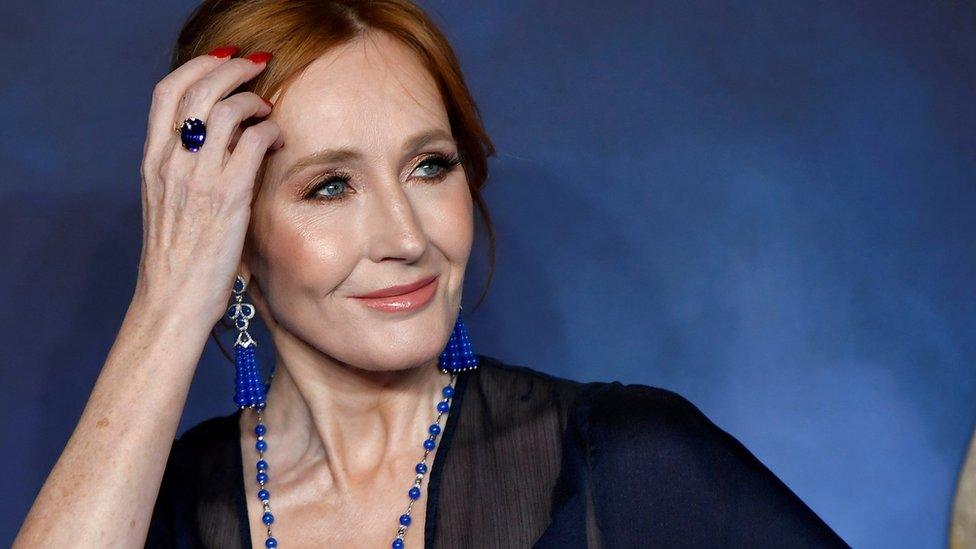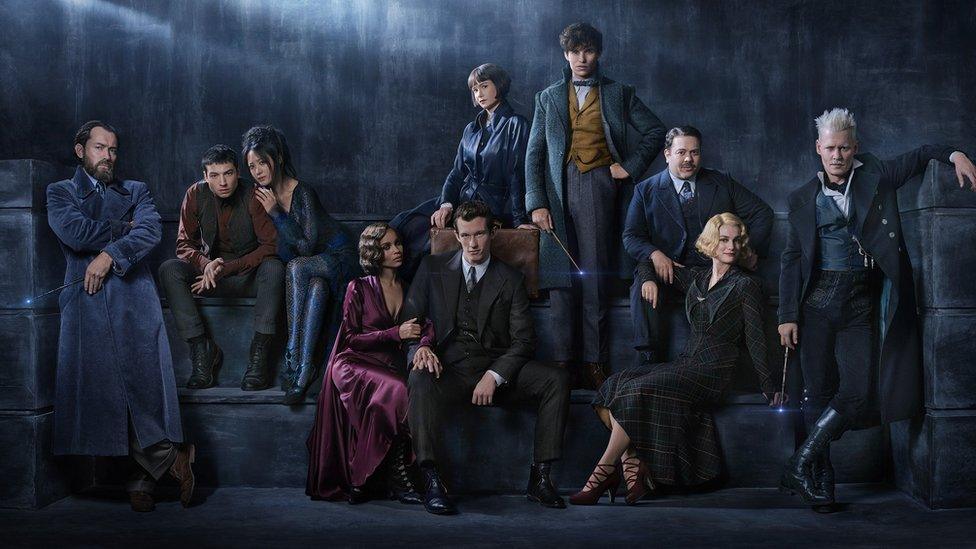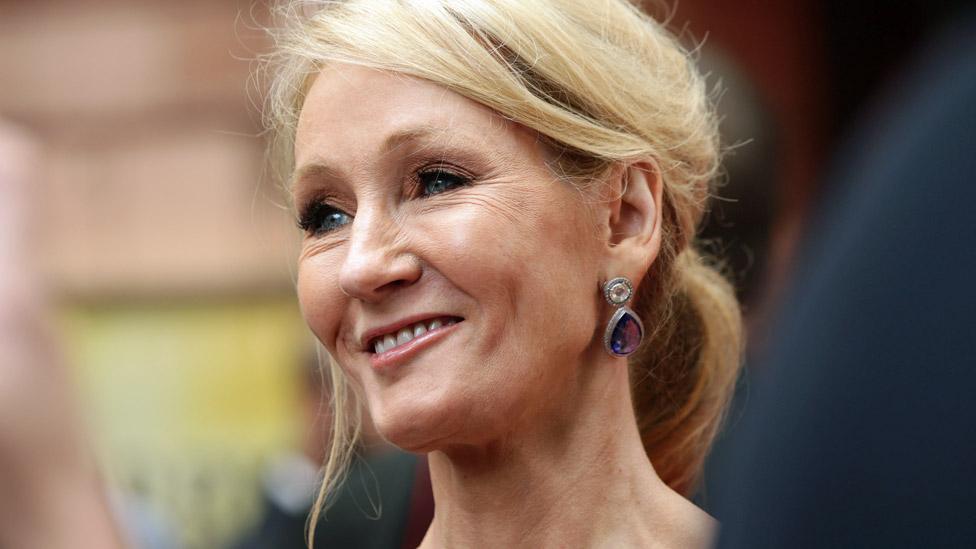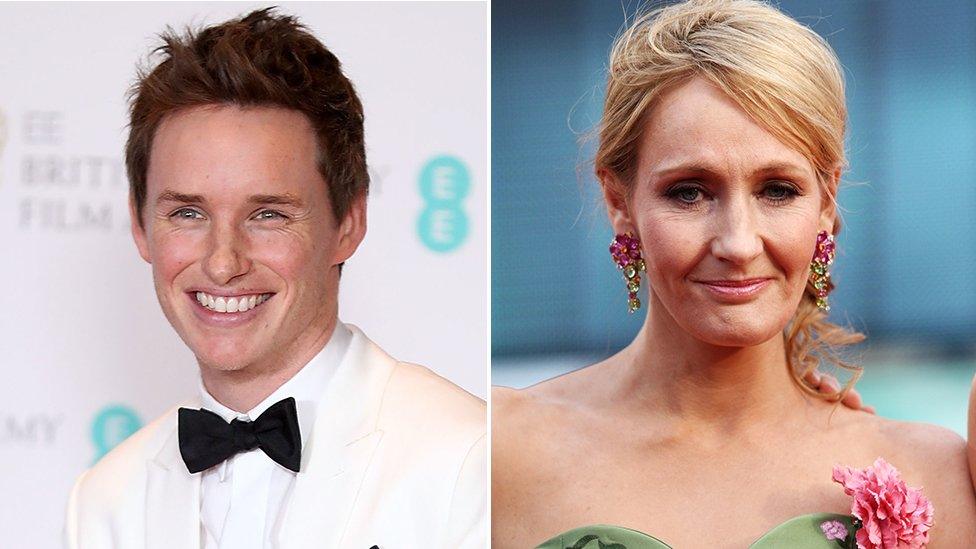JK Rowling responds to trans tweets criticism
- Published

JK Rowling has said she spoke out about transgender issues in part due to her personal experience of domestic abuse and sexual assault.
The Harry Potter author addressed criticism of her response to an article that described "people who menstruate".
In a lengthy blog, external, she wrote her interest in trans issues stemmed from being a survivor of abuse and having concerns around single-sex spaces.
Actor Daniel Radcliffe was among those critical of Ms Rowling's comments.
In the blog post published on Wednesday, Rowling, 54, detailed what she said were the five reasons why she felt the need to talk about the issue.
These included her interest in "both education and safeguarding" and "freedom of speech".
Explaining her final reason, she wrote: "I've been in the public eye now for over 20 years and have never talked publicly about being a domestic abuse and sexual assault survivor.
"This isn't because I'm ashamed those things happened to me, but because they're traumatic to revisit and remember.
"I also feel protective of my daughter from my first marriage. I didn't want to claim sole ownership of a story that belongs to her, too.
"However, a short while ago, I asked her how she'd feel if I were publicly honest about that part of my life and she encouraged me to go ahead.
"I'm mentioning these things now not in an attempt to garner sympathy, but out of solidarity with the huge numbers of women who have histories like mine, who've been slurred as bigots for having concerns around single-sex spaces."
Radcliffe, the star of the Harry Potter film series, and Eddie Redmayne, who leads the cast of the Fantastic Beasts movies, have both criticised Rowling for her comments about transgender issues.
Emma Watson, who played Hermione Granger in the Potter franchise, said, external: "Trans people are who they say they are and deserve to live their lives without being constantly questioned or told they aren't who they say they are."

Eddie Redmayne has played Newt Scamander in two Fantastic Beasts films so far
The row began last weekend, after Rowling responded to a headline on an online article discussing "people who menstruate" by writing in a tweet: "I'm sure there used to be a word for those people. Someone help me out. Wumben? Wimpund? Woomud?"
Critics accused her of being transphobic, but Rowling said she stood by her comments, saying it "isn't hate to speak the truth".
Allow X content?
This article contains content provided by X. We ask for your permission before anything is loaded, as they may be using cookies and other technologies. You may want to read X’s cookie policy, external and privacy policy, external before accepting. To view this content choose ‘accept and continue’.

"My life has been shaped by being female. I do not believe it's hateful to say so," she said.
"I know and love trans people, but erasing the concept of sex removes the ability of many to meaningfully discuss their lives."
In December last year, the author voiced her support for a researcher who was sacked after tweeting that transgender people cannot change their biological sex.
'Misogyny'
In the blog post on Wednesday, Rowling said she was motivated to address transgender issues through her Twitter account because of what she sees as an increasingly misogynistic society.
"We're living through the most misogynistic period I've experienced," she continued.
"Back in the 80s, I imagined that my future daughters, should I have any, would have it far better than I ever did, but between the backlash against feminism and a porn-saturated online culture, I believe things have got significantly worse for girls.
"Never have I seen women denigrated and dehumanised to the extent they are now."

What is the reaction to JK Rowling's statement?
Dr Kathleen Stock, professor of philosophy at the University of Sussex, told BBC Radio 5 Live that JK Rowling is "right to want to protect women-only spaces".
Allow X content?
This article contains content provided by X. We ask for your permission before anything is loaded, as they may be using cookies and other technologies. You may want to read X’s cookie policy, external and privacy policy, external before accepting. To view this content choose ‘accept and continue’.

Feminist blogger Claire Heuchan said, external she had "a whole new level of respect for her courage and compassion".
But writer and YouTuber Jackson Bird, who wrote about how Harry Potter fandom helped him come out as trans in his memoir, told Variety he was disappointed with Rowling, external.
"For her to decide to use her incredible platform to be very critical and hateful towards a particular group of people, it just seems an irresponsible use of the platform by one of the most influential people in the world," he said.
Some of the cast of Pose, a US TV drama series about New York's underground world of 1980s ballroom culture, told Variety, external the author's views were "hurtful".
Indya Moore said she was a fan of Harry Potter because it provided an "escape" and even a sense of "liberation". She said: "It's so hurtful but also I'm not surprised by it."
The Washington Post's Molly Roberts added, external: "JK Rowling's transphobia shows it's time to put down the pen."
But singer Alison Moyet added, external: "Regardless how I feel about anything, I always hated a pile on since schooldays. Even against those that've been hateful to me. As it happens JK Rowling is not hateful.
"I see a woman convicted and hung and wonder where the same venom is for the men that do actual harm to all womankind."
Warner Bros, the Hollywood studio behind the Harry Potter films, responded by saying it was committed to confronting "difficult societal issues".
"Warner Bros' position on inclusiveness is well established, and fostering a diverse and inclusive culture has never been more important to our company and to our audiences around the world," it said.
"We deeply value the work of our storytellers who give so much of themselves in sharing their creations with us all. We recognise our responsibility to foster empathy and advocate understanding of all communities and all people, particularly those we work with and those we reach through our content."
Read more:
- Published11 June 2020

- Published10 June 2020
